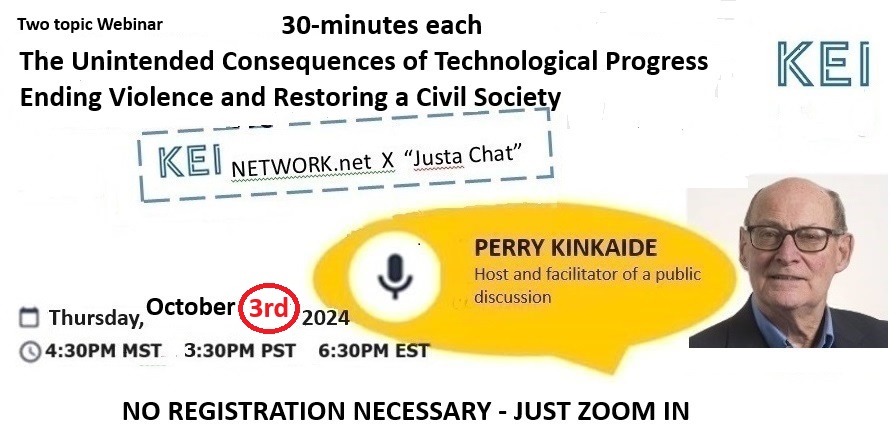 Without meaningful change, society faces a steady decline into chaos
Without meaningful change, society faces a steady decline into chaos
- Violence has become the default response to disagreement. See also Troy Media HERE
Are we at war? This question haunts me every time I hear about another shooting or violent incident, whether it involves a student, a police officer, a teacher, an innocent bystander, the homeless, even fear mongering, hate inspiring lies about immigrants feasting on pets. See The Revolt of the Public HERE and Debunking Springfield HERE
As human beings, we pride ourselves on being civil, yet both personal and collective forces seem to drive us deeper into violence. We no longer live in a time when the guillotine or electric chair were seen as acceptable punishments, but the institutions meant to uphold civility seem powerless in the face of increasing violence.
Schools, once safe havens for learning, are now turning into battlegrounds where students need protection from the world they are supposed to be preparing for.
The problem isn’t just the weapons used in these violent acts – assault rifles, handguns, knives, drones – but the uncivilized minds wielding them including hateful.politiciabs. We can imprison people and try to remove the tools of violence, but the deeper issue remains unsolved. Our society is failing to address the root causes of this growing violence. This raises important questions: What drives this anti-social, uncivil behaviour? What pushes people towards violence? Are our current strategies for prevention making any real difference?
Even in areas where civility should reign, we see a new rise in aggression. Once, political opponents could disagree and still maintain respect for each other. Now, it often feels as though hate itself is being cultivated, with rhetoric encouraging the demonization of one’s political opponents. The practice of healthy debate and democratic competition is deteriorating into a battlefield of hostility and contempt. What kind of example does this set for the next generation? If even our leaders and public figures can’t model civil discourse, how can we expect society to remain peaceful? Hate has displaced humour.
Some say punishment is the key to deterring crime, but the reality is more complex. Have hate laws truly reduced hate, or have they simply driven violence into darker, more hidden forms? The threat of punishment might suppress violent behaviour temporarily, but it doesn’t deal with the underlying forces that drive people to act out. Punitive measures alone won’t create a civil society; they only hide the symptoms of a much deeper issue.
In the past, the solution to uncivilized behaviour was often swift and brutal – an “eye for an eye” approach that aimed to eradicate violence through fear. Today, we’ve moved away from such methods, viewing them as too barbaric, instead turning to education and rehabilitation. Education is often promoted as the key to creating a more civil society, but even that falls short. Once, churches played a central role in instilling moral codes and civil behaviour, guiding individuals through faith. But times have changed, and those institutions no longer hold the same influence.
So, where does that leave us? Our schools, homes, and communities are buckling under the weight of unchecked violence, and yet we seem unsure of how to stop it. We can’t continue to tolerate uncivilized behaviour in a society that calls itself civil. But when do we finally say, “Enough is enough”? And what steps should we take to prevent further violence?
The answer to an effective, long lasting solution isn’t simple. It requires a multi-faceted approach that includes better parenting, more effective education, proper use of medication, and improved policing. But it also calls for a deeper cultural shift that takes a hard look at the values we’ve been passing down to future generations. Have we, in our pursuit of progress and prosperity, overlooked the fundamental need for empathy, respect, and moral accountability?
At 82 years old, I find myself deeply concerned about the world we are leaving behind. The legacy of neo-liberalism, which champions individualism and economic success above all else, has left us with a fractured society. The values that once bound us together – community, co-operation, civility – seem to have been replaced by division, isolation, hostility, a displaced faith in technology. In fact, technologies in all forms are serving to exacerbate the violence.
We have become a society of people more focused on winning than on understanding each other, more preoccupied with punishment than prevention. Core is the collapse of the welfare state under the weight of debt, an ageing population, ever rising promises and increasng expectations, eroding personal responsibility and parenting.
This is not to say that all hope is lost - we need not be passive lemmings or violent activists. But we cannot continue down this path without facing serious consequences. Something has to change, starting with acknowledging that our current systems are not working. We need new ideas, new strategies, and a renewed commitment to building a genuinely civil society – one where violence isn’t the default response to conflict and where empathy and respect are valued personally AND publicly as much as success and power.
The time for reckoning is now. If we don’t act soon, we risk losing not just the battle against violence but the very essence of what it means to be civil. And that’s a war we cannot afford to lose. - Editor

NO WEBINAR this week. Reply with your views on the decline of civility for discussion in a webinar October3rd.

https://us02web.zoom.us/j/84258596166?pw..
 Email Editor@KEInetwork.net
Email Editor@KEInetwork.net
![]()
Visit KEInetwork.net